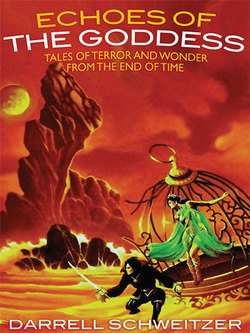Читать книгу Echoes of the Goddess - Darrell Schweitzer - Страница 6
На сайте Литреса книга снята с продажи.
ОглавлениеPROLOGUE
The Goddess is dead. The Earth is very old. The fabric of time itself has worn thin. Who knows what might be glimpsed through it?
—Opharastes, After Revelation
At long last, she died. The Goddess of Earth, the Mother of Centuries, the dual mistress of dreams and nightmares, of the burning light and the impenetrable shadow, died.
It was revealed. The prophets knew, but did not proclaim it. There was nothing left to prophesy, save that in some remote, unimaginable future, the godhead would be reborn yet again in a form too strange to be described, like a storm once more gathering strength out of dissipated winds.
But for now, in the interregnum, would be an age of random portents and incoherent miracles.
The priests knew, but kept silent. They heard the divine voice fading away like an echo in a vast cavern.
About this time a certain soldier was mustered out of the army in Ai Hanlo, the capital of the Holy Empire. Wasting his money in taverns, drunk, exhausted from one last debauch, feeling desperation in his soul, he wandered across the plains, into the hills, without seeming direction or purpose, without any goal except to seek rest, to find peace. In his nightmares, all those he had slain in battle pursued him, screaming, their red wounds gaping. He cried out in fear and awoke in darkness, amid the spray of winter rain, but even while he was awake, the dead men proclaimed the news to him, saying, “Our deaths are as nothing. Behold. Look up.”
And he looked up. The clouds parted, and he saw the Goddess falling across the sky, her hair trailing like a comet. To such an unworthy man as he, this vision came, while around him the ghosts of his enemies dissolved like soft clay in the rain.
The soldier abandoned his name, or perhaps forgot it, and lived namelessly until he felt himself worthy, and then assumed another name, Telechronos. Because he happened to dwell in the land of Hesh, he was called the Heshite, though even he no longer knew his exact origin. It was given to him to explain to mankind how, in the fullness of time, even the Goddess must perish, how the fragments of her divinity are scattered across the world like drifting ashes, some of them taking the forms we call the Bright Powers and the Dark, miraculous and dreadful yet not alive, like shadows that can speak.
He explained, too, why young men dream dreams and old men see visions, but the dreams and visions are without any intelligence or meaning, directionless, even if they are still holy.
For in the time of the death of the Goddess the worlds roll aimlessly in the dark spaces, without any hand to guide them. The Powers roam the earth and sky, working merely arbitrary wonders, leaving men to make what sense of them they may.
Let the many voices of these times speak.
Let the stories be written.
In the time of the death of the Goddess—
